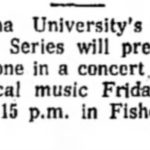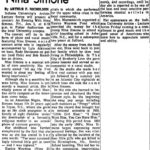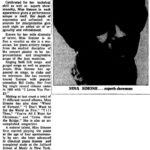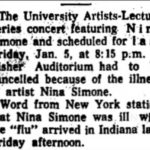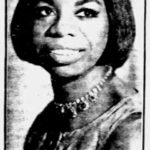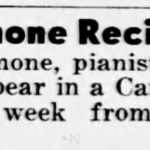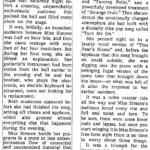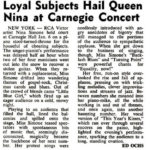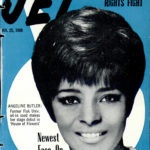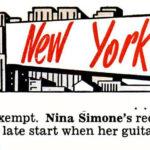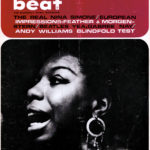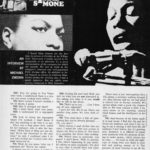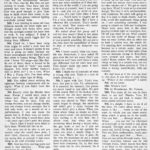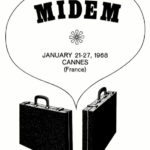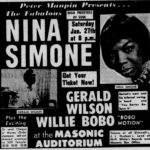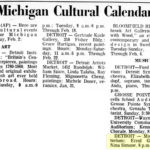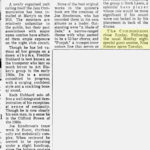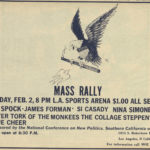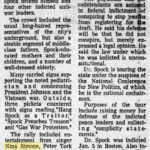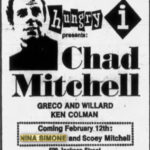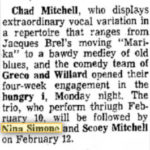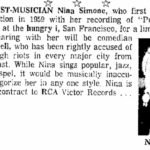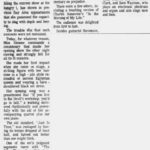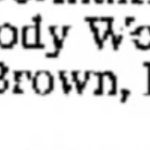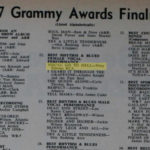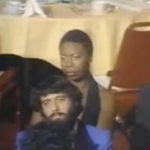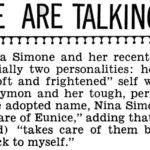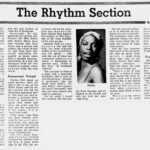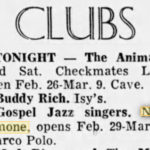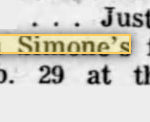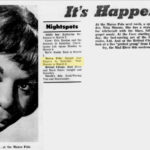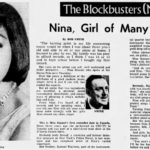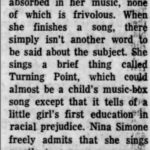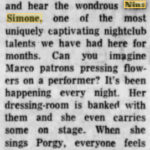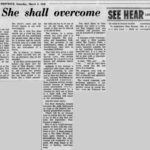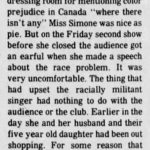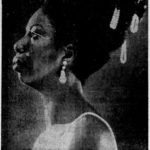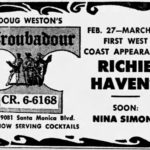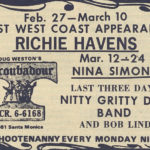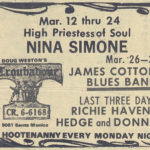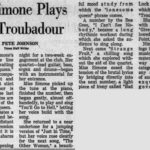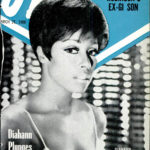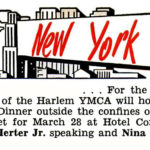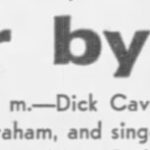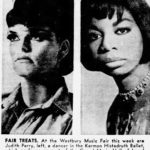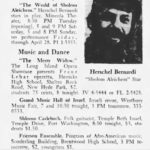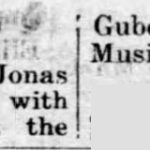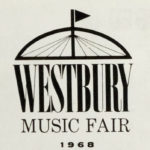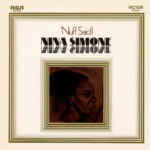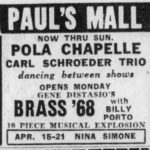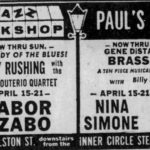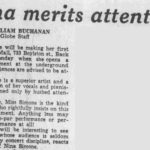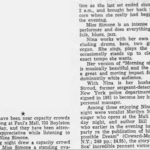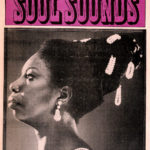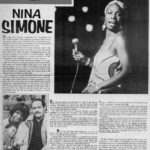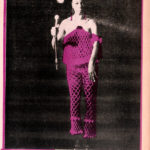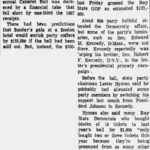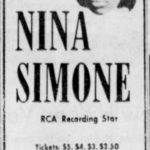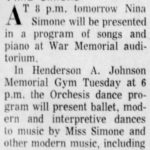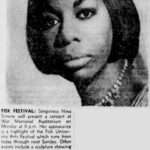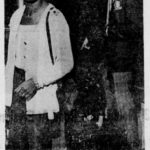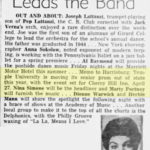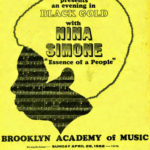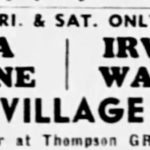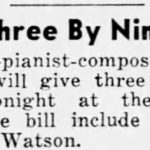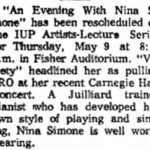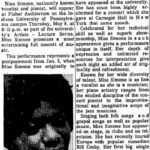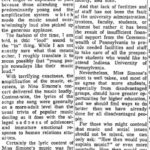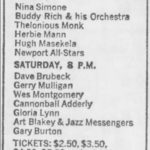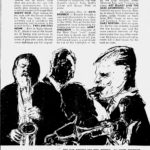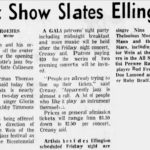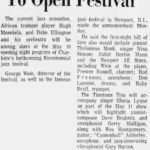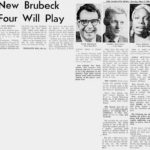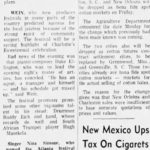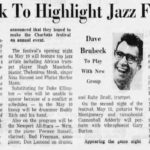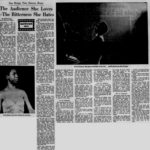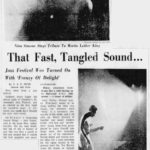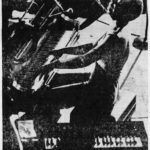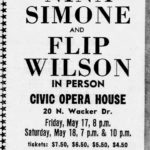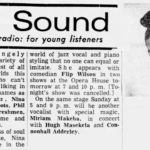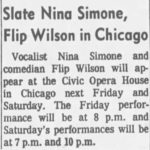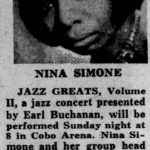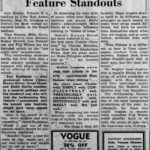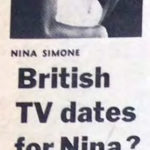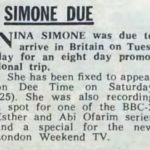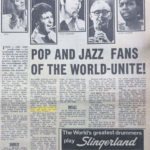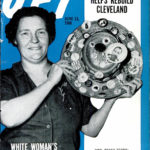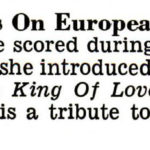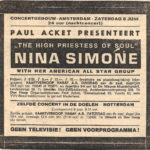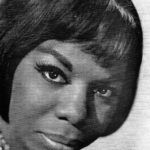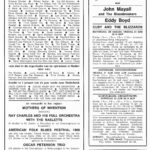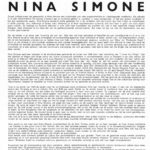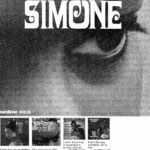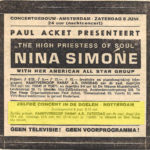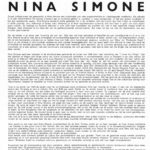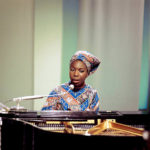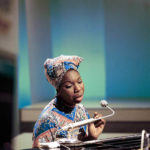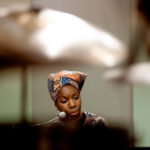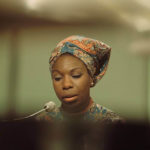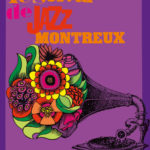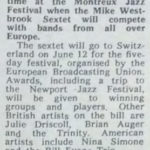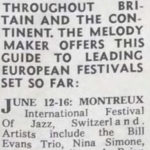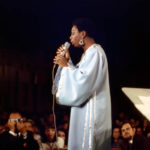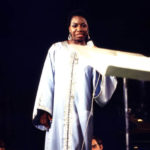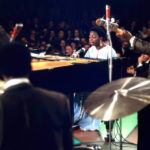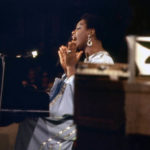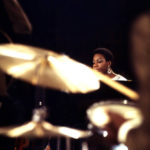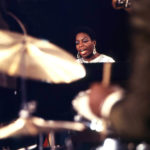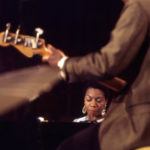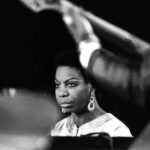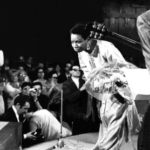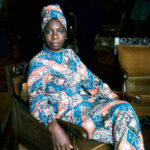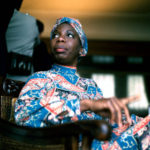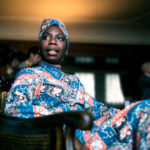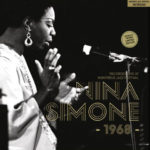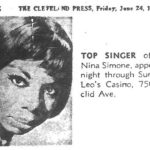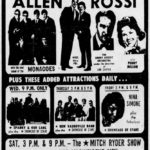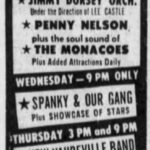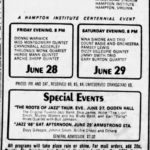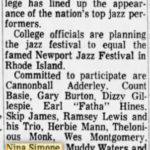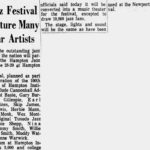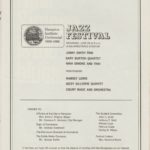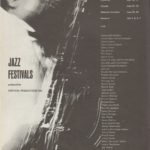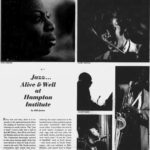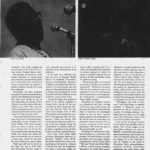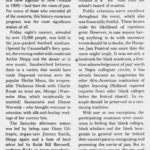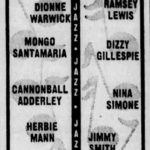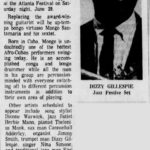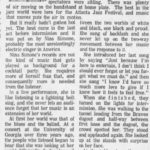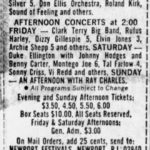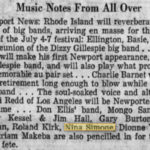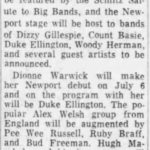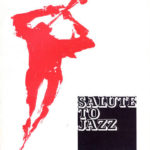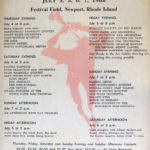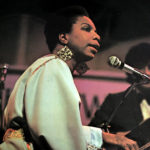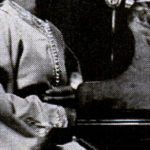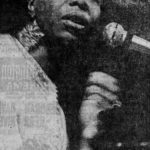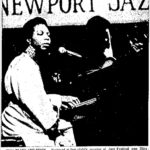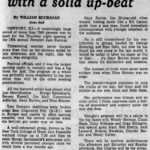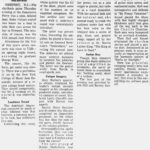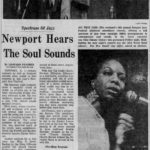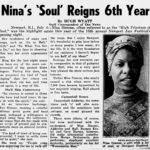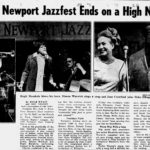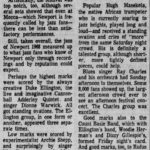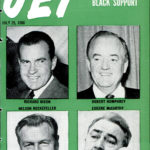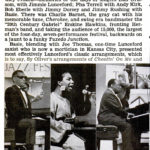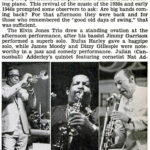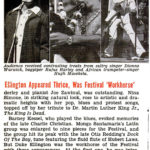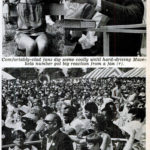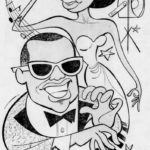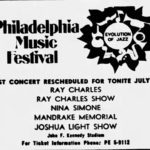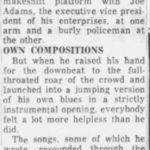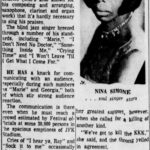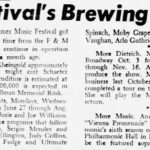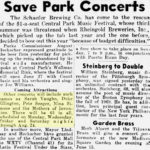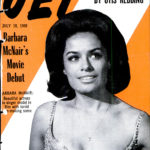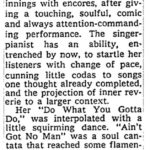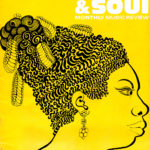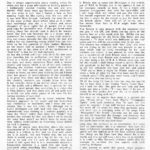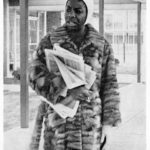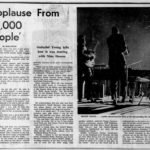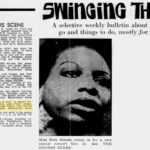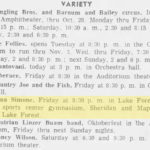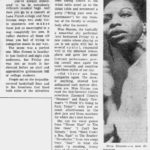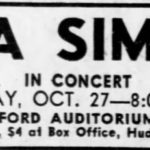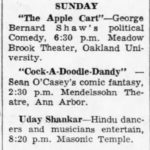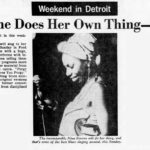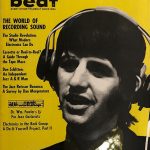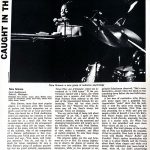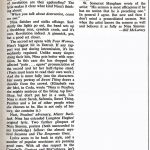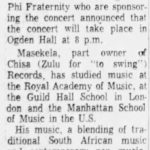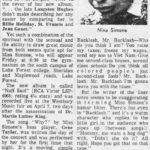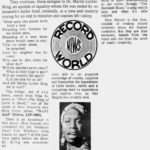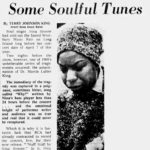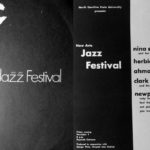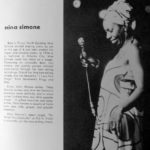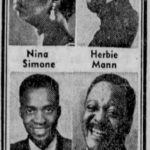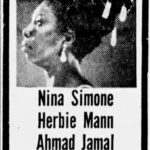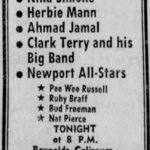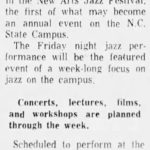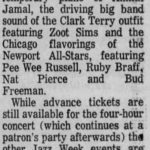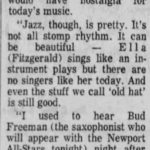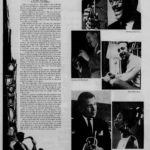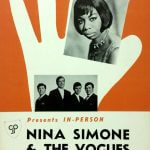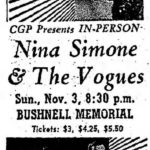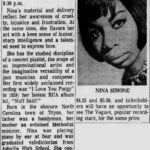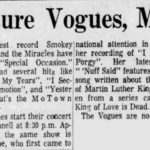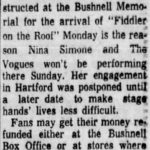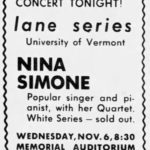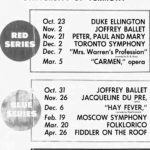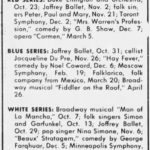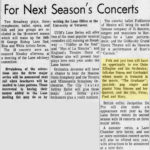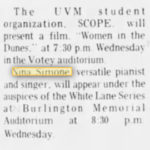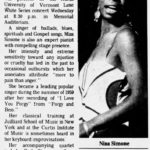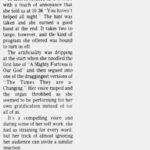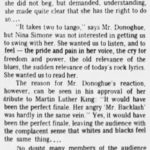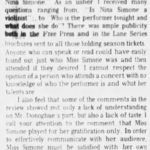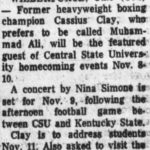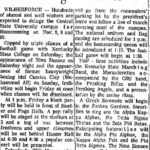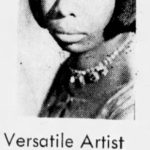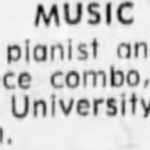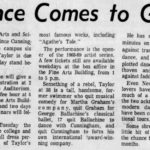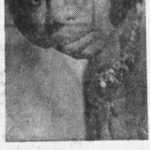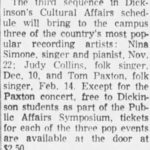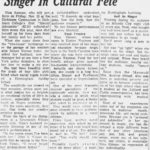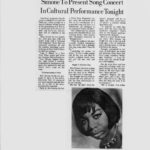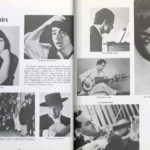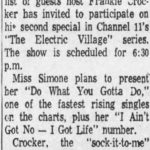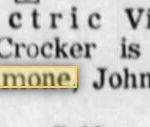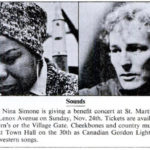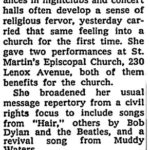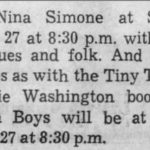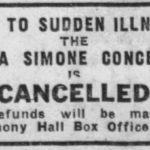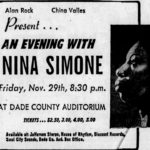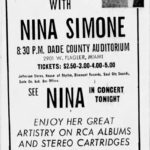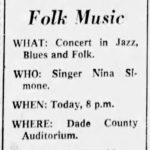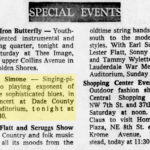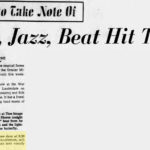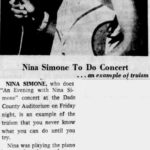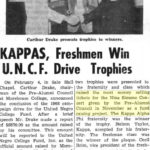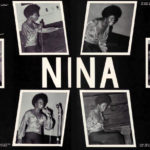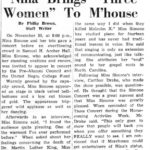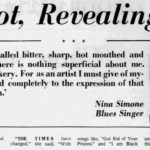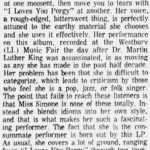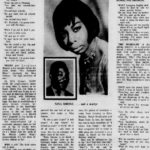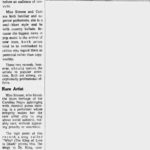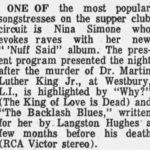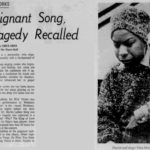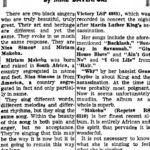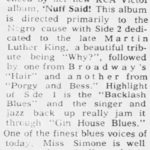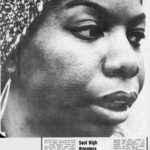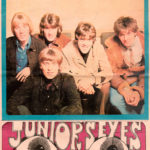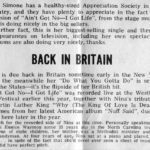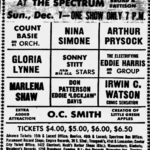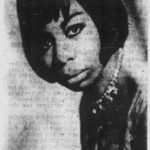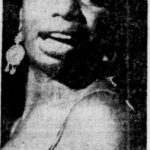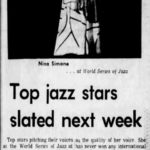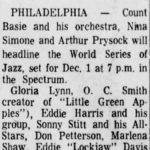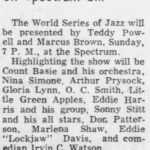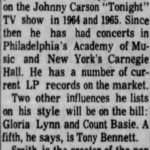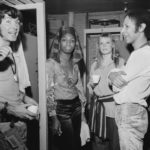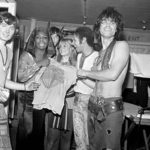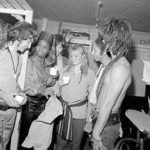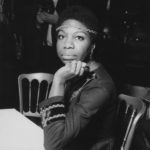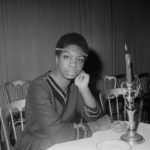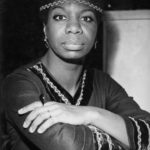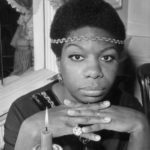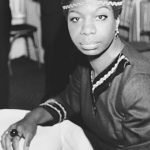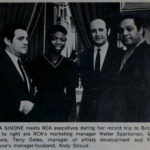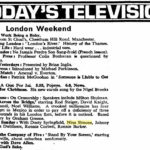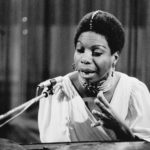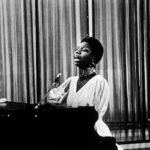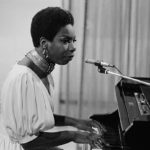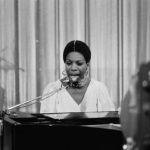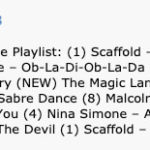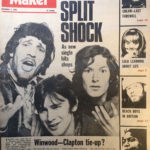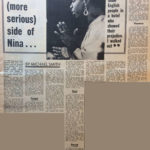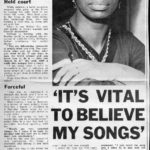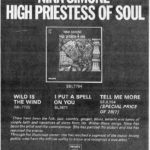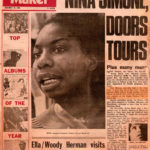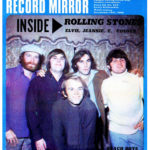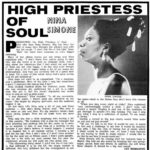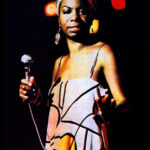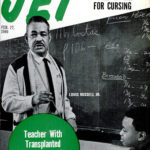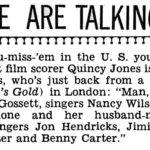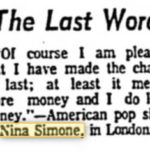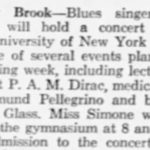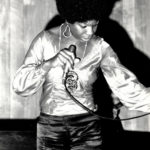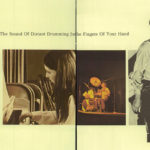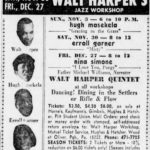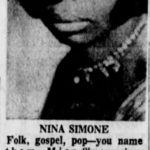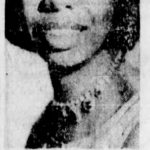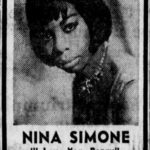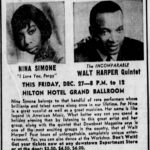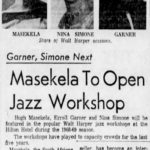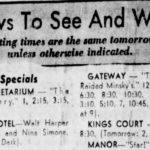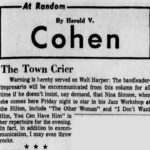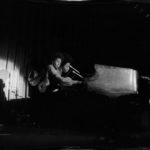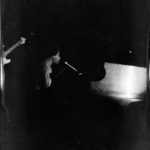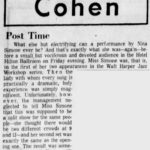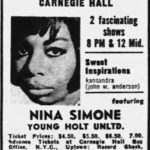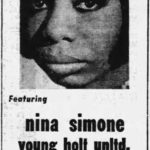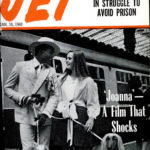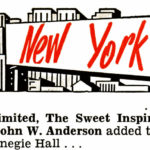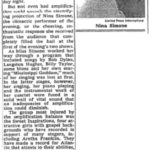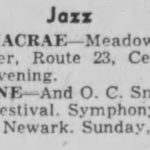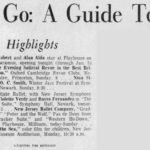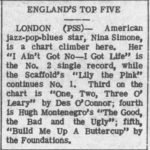1968
THE REAL NINA SIMONE
by Michael Zwerin
I heard Nina Simone for the first time in person in October at the Village Gate. Impressed, I readily agreed to the suggestion of an interview by a press representative of the company for which she records. We met at noon in her manager’s carpeted and well-appointed Fifth Avenue office. In addition to being bugged, as always in midtown Manhattan during the working day, I had a dandy hangover. But my spirits were soaring compared to Miss Simone’s.
MZ: You are going to Las Vegas next week. I understand there is a reason you never worked there before.
NS: Same reason I haven’t worked a lot of places, I guess.
MZ: Has it changed out there?
NS: I don’t know what you mean.
MZ: I understand it’s a segregated town.
NS: Lots of towns are segregated where I’ve worked. I don’t know if that has anything to do with it or not.
There was a long pause here, ended by her manager, who is also her husband. “What kind of thing are you doing? We’re not interested in the race issue,” he said. I explained what I do and who invited me. I asked what they were interested in.
NS: What do you mean ‘what I’m interested in?’ You’re the writer.
I almost got up to leave. I wasn’t in any mood to cope with this kind of thing. I have always hated formal interviews anyway. Why had I come? I’ll never learn, I thought.
NS: It makes no difference to me. I’m not the one who wanted the interview.
MZ: (Losing his cool fast) Well, you told me what you are not interested in. I’m asking you what is it you would like to talk to me about.
NS: That’s up to you…Can I bum one of your cigarettes?
I gave her one. We lit up. There was another long pause. We were both resisting.
NS: You must have a line of questioning that you’ve already planned…Oh, don’t you?
More silence. I sank further into my chair. I asked her what pop groups or singer she likes to listen to. Not much of a question, but better than nothing.
NS: Which ones in particular, you mean? I don’t know. Well, in general, I like what’s happening in pop music. It’s taking on some standards—I’m glad to say—that it should have had years ago. I believe the time will come when the whole definition of pop music will change. It will get to the point where a song will not be a good song until it has a high level of creativity in writing and performance. In other words, in order to be popular, songs will have to meet these high standards.
There were a few interruptions here. The phone, a secretary walking through, etc. Miss Simone told me she had given a concert tour in Europe recently. We agreed about what a good city Amsterdam is. We both relaxed a little. I became aware of her stunning, natural beauty and the intelligence in her eyes.
NS: And because of the better quality in pop music, I find that the gap between my audience and what I am trying to say is closing. I still have the old audience I had before, but it’s growing now. However, it is difficult to retain your standards with the pressure of trying to make money, which always has its rules…It’s hard to walk the tightrope of doing what you think is your best and making money at it. The pressure of show business is on all the time and show business is a fickle business. Whatever is popular now—that’s all that counts. I have to constantly re-identify myself to myself, reactivate my own standards, my own convictions about what I’m doing and why.
MZ: That’s why the Beatles are so amazing. They don’t have to grow or change, but they seem to have a need to…
NS: The Beatles are lucky, very lucky. But what has happened to them has nothing to do with them, in a sense. They came along at the right time. Attention was focused on them. They’ve had the chance to grow in almost any direction they wanted. Very lucky. They are not exceptionally talented. Uh uh. They may be. But they are just starting to create. They have just discovered that they have talent, friend. Fate was good enough to give them time to think about their talent, to develop it as they please, without fighting everybody around them.
MZ: I was listening to some old Joao Gilberto records the other night, and I thought about how bossa nova came into the spotlight around the same time as rock. It was eclipsed. I think it could have been much bigger had the timing been different.
NS: Could be. I have been using what might be called a rock beat for years and years. It doesn’t matter to me what is going on today because my music encompasses every kind of mood that exists in human beings. That’s my stick. I know 700 songs—just like that. So out of them, there is bound to be almost any kind of “style” you could imagine. You know Bobbie Gentry’s “Ode To Billie Joe”? I do a tune, “When I Was A Young Girl,” I’ve been doing it for years—same type of thing.
MZ: You talked about walking the tightrope between compromise and integrity. What if you didn’t have this limitation?
NS: Exactly what the Beatles have done. Except I would have done it before now. There are all kinds of things that can be done. You can change rhythms, you can change chords, you can change whole concepts. But it will only work, on a record or in a performance, if you can make the people buy it. If there were no restrictions, the first thing I would have done—six years ago—don’t print this please…That’s what I would have liked to have done. Would still like to do.
I’m sorry not to be able to tell you exactly what she would have done. I don’t think, however, she would mind my saying that, in general, it has to do with extended works.
MZ: Jazz has been moving more and more in that direction…What jazz musicians do you like?
NS: As far as piano players are concerned, Oscar Peterson is my very favorite. I also like McCoy Tyner. I think that the big jazz stars, both now and in the past…how shall I say it? These guys are as great as Bach, Beethoven; all of them. People don’t know it yet. If jazz survives and is put on a pedestal as an art form, the same as classical music has been through the years, a hundred years from now the kids will know who they were, with that kind of respect. This may or may not happen. In the meantime, unfortunately, as they get older, some of them get bitter. Music is an art and art has its own rules. And one of them is that you must pay more attention to it than anything else in the world, if you are going to be true to yourself. And if you don’t do it—and you are an artist—it punishes you. It’s true! Like when I leave you…You’ll have to forgive me if I’m a little brash today. But I have a rehearsal this afternoon. That’s mostly on my mind. That music—it’s something else. It really gets you.
We talked about her group, and I told her how much I liked it, her piano playing, and the fact that her bass player was properly amplified. My pet peeve has long been the inaudibility of basses in jazz. (I noticed my hangover was gone.)
MZ: I think that is symbolic of what is wrong with jazz. There is a lack of simple planning, a…
NS: I agree with that. That’s true, love, that part is true. It’s unfortunate. It is assumed, for instance, that pianos are never tuned in jazz clubs. It’s part of the sound. Half of the broken down sound—in the old days anyway—was the broken down conditions that the music was played in. Then when the music began to change, the musicians still didn’t give a damn because the owners didn’t give a damn. When you think about things as simple as cleaning a men’s room—the musicians really have nothing to do with that—but it affects them. And when you start screaming about having a decent mic, the guy looks at you as if you are crazy. He thinks you are egotistic because you want a simple thing to do your best. That’s the way it goes. By the time the musicians do get a decent place to play in, and the conditions they have been screaming for, by that time they seem not to care anymore. So it goes.
MZ: It’s different, though—better—in Europe. Why, do you suppose?
NS: You know why. You know why…the people. We’re in trouble over here, bad trouble. And I mean a lot more than with jazz.
MZ: Have you ever thought about moving to Europe?
NS: I think of it a lot. I’m just riding with the wind. You know, I was born here and nobody really wants to move from where their roots are. Whichever way it goes, though, I’ll go. In a way, the fact that we are in trouble is a good sign. We recognize it now, at least. In order to clean up all the crap. You can’t do that until you realize that—you—are—in—the—midst—of it. We got so much crap here. Wow! It tends to be obscured though. We bury it with intellectualism, with confusion. So much talk going on that it is hard to think clearly. And we hide, avoid the unpleasant things going on. I saw something yesterday. I was going to church on 54th and Lexington. There were some kids in the street playing football right on Lexington Ave. I’ll tell you what hit me. What amazed me was the order of things—the fact that we wear clothes, that an office has to look a certain way, the whole bit. It’s amazing how accustomed we have become to a certain order. And you become more aware of that order when you see something change it. Everybody turns around and stares. But why, really? Rules, orders. We have ordered things so long in a certain way, we are numb. Nobody dares question it. This is what is wrong, symbolically, with my country.
We has been at it for over an hour by this time. It was time to wind things up. “Where is the rehearsal?” I asked.
NS: At my home.
MZ: Where’s that?
NS: In Westchester, Mt. Vernon.
MZ: You came all the way in from there to see me? Thanks. Wow. I’d better let you get back to music. No more public relations today.
NS: It’s alright. I have to do it all the time. It’s funny about music…music is like…music is one of the ways by which you can know everything which is going on in the world. You can feel…through music…Whew…you can feel the vibrations of everybody in the world at any given moment. Through music you can become sad, joyful, loving, you can learn. You can learn mathematics, touch, pacing…Oh my God! Ooh…Wow…You can see colors through music. Anything! Anything human can be felt through music, which means that there is no limit to the creating that can be done with music. You can take the same phrase from any song and cut it up so many different ways—it’s infinite. It’s like God…you know?
Afterwards, despite the shoving, fumes, and noise of Fifth Avenue in the afternoon, I felt that interviewing people wasn’t so bad after all.
Nina’s performance at the Westbury Music Fair on April 7th occurred three days after the assassination of Martin Luther King Jr.
Nina’s performance included a song she penned in MLK’s honor, “Why? (The King of Love Is Dead)”. This became known as the ‘MLK Suite’ and was included on her album ‘Nuff Said.
On stage, Nina Simone is regarded as an “experience” by both press reviewers and audiences in general. People of all age groups seem to be arrested by Nina’s spellbinding performances, and even the more seasoned critics are impressed with the unusually wide diversity of her talent.
Most artists fall into one of two categories, either fine vocalists or great musicians, but Nina is a rarity. She shows both talents with equal brilliance. Her keyboard ability, for example, displays a rare extent of musical breadth, ranging from the studied discipline of concert pianist to the improvisational and imaginative scope of a jazz musician.
The circumstances under which Nina emerged as a pianist-singer are perhaps as amazing as the dual achievement itself. Her career as a pianist began at the age of four when she simply stepped up to the piano and started playing by ear! Soon afterward, she was taking classical piano lessons, and she continued on to advance study, later eventuating at the Juilliard School of Music in New York.
Nina’s debut as a vocalist happened by accident, through a mix-up in booking arrangements. She was hired at an Atlantic City night club in the summer of 1954 supposedly to play piano, but on her first night she was told that the job required singing too. Desperate enough for the money, she made a stab at doing some songs even though she had never sung in her entire life! The audience reaction turned out to be so enthusiastic that she was encouraged to pursue a second facet of her talent.
Born Eunice Waymon on February 21, 1935 in the obscure North Carolina town of Tryon. Nina was the sixth of eight children. Her father was a handyman, and her mother worked as a housekeeper during the day, and, at night, wore the robes of an ordained Methodist minister.
Her early life was one of constant hardship, and Nina struggled to secure her academic and musical education, but now she is enjoying the results of her hard work personally as well as professionally.
Nina lives in a large three-story, nine-room house in Mr. Vernon, NY with her husband, Andy Stroud, and their daughter Lisa Celeste who came along September 12, 1962. Married to Nina in December of 1961 after a whirlwind courtship, Mr. Stroud was then a Detective Sergeant on the New Your City police force.
After their marriage, Andy resigned to take over as Nina’s personal manager although at the time he was just set for a promotion to Lieutenant.
Among Nina’s favorite hobbies is a passion for interior decorating, and the product of her textbook learning plus her own imaginative hand is evident in the Stroud home. She also manages to find time for swimming, scuba diving, bicycling, reading and studying interpretive dancing.
Nina’s enormous capacity and need for expression have found a rewarding outlet in her role as a mother. She has already made plans to take little Lisa with her on all out-of-town engagements. The idea of being separated from her daughter for a career, or for anything, never did set well with Nina.
Lisa seems to be a chip off the old block as far as music is concerned. She was banging on the piano at eight months of age and now, at two, shows a remarkable sense of harmonics and timing for a child her age. Nina is impressed with so early an indication of musical talent and wouldn’t be surprised if someday her on-stage appearances were billed as a duo instead of a single.
It was in 1959 that Nina skyrocketed to disc fame with her big hit recording of I Loves You Porgy. And it was the same year that Nina added song-writing to her career as a pianist and singer. During her first recording session, two scheduled songs were suddenly scrapped and to fill the need Nina wrote to more right on the spot. Since then, she was written and recorded many more of her own songs.
Now that Nina is an established songwriter herself, she has become an ardent fan of amiable and fabulously successful Benny Benjamin whose catalogue of hits could fill a small encyclopedia. To mention only a few: Wheel of Fortune, Rumors Are Flying, I Don’t Want To Set The World On Fire Till Then, You’re All I Want For Christmas and Cross Over The Bridge. A Benjamin tune is invariably included in a Nina Simone album, and Nina recorded six of his songs in her Broadway-Blues-Ballads LP.
No Nina Simone performance is quite the same as any one preceding it. Her depth of expression and her seemingly unlimited resources for interpretation give each performance an added air of originality and refreshment. When Nina dons the familiar bandanna and apron-fronted gown for Pirate Jenny, her audiences are suddenly aware of the real meaning and significance behind these fearful lyrics from The Threepenny Opera.
Nina’s concert reviews are filled with rave notices which in turn are filled with the most extreme adjectives acclaiming her technical skill and superb showmanship. Music experts and average laymen alike all agree that she has so much talent…and with so much talent to spare.
NINA SIMONE – IMPRESSIONS OF A GREAT ARTIST
by Dave Godin
One is always apprehensive about meeting artists for whom one has a great admiration or burning passion – I deliberately avoided meeting the one and only Howlin’ Wolf many years ago because my admiration for this artist is such that I feared a face to face meeting might be like staring into the sun, and so it was with Nina Simone.
Certainly she must be one of the most written about artists since as it is common knowledge that she is a militant and active champion of equal rights for all people she is very good copy for journalists who, if they get bored about writing about her records (and it should be remembered that first and foremost she is a singer, and a spokesman for humanity running a very close second), they can always provoke her into losing her cool and making her say something which they can then write up for the appetites of their readers. However, on her recent visit to London I knew I would have to meet her at last since one of my co-directors at “Soul City” is also her fan club secretary.
At last she arrived and I can only think for one word that describes her to perfection and that is “cool.” There is a feline grace and beauty about her in all she does, and every movement flows with a natural rhythm and beauty which is all of her own creation.
Wearing the shortest mini-dress outside of a nudist colony, her hair natural and short, and the latest fashion in shoes, we were soon chatting like old friends since her power of communication in her recordings is so great that when one does meet her, it is really like meeting someone you already know since she is her records – there is no artifice about her, no act for the public and a different one in private, for she is such a total person that everything is a unity – she is Nina Simone, and that alone tells all and spills over to enrich not only every aspect of her own life but various sections of ours too!
It has always puzzled me to know whether Miss Simone’s approach to music and her humanities was intellectual or emotional, and I drew the conclusion that it was the latter, for although she is highly intelligent and well read (she was, it must be remembered, once training as a concert pianist), it is what she “feels” rather than what she “thinks” that decides her attitude for her, and since I am in exactly the same boat myself we didn’t have to waste any time talking technicalities or theorizing about beliefs we held in common.
She was of course very disturbed about the recent assassination of Dr. Martin Luther King, and her latest release is a tribute to him and his aims with which she is in accord. She said frankly that she did not think it would prove to be a big hit for her, but it had to be said, and I’m sure all readers who have heard it will agree that it is a remarkable document. Remarkable however is a word that one tends to over-word when describing Miss Simone’s recordings.
She is so versatile and so consummate an artist that everything is performed to a perfection that meets her own exacting demands – when she is satisfied then the record can be released and she is confident that she has produced an item worthy of her name.
Her last record “To Love Somebody” was not released in Britain due to some odd blind-spot in the artistic eye of RCA in Britain, but in my opinion is one of her strongest records to date. It has a heavy and complex arrangement that suits her splendidly, and I still hope RCA will relent and put the title out. She herself expressed her sorrow at this move since she felt it might be the record to put her back into the British charts. Time will tell of course, and a few letters from fans to RCA might make them reconsider.
Miss Simone is very pleased with the reception that she gets in the UK, and thinks she has some of the loyalist fans an artist could wish for. Whilst she was here she appeared on the Simone Dee Show, and also recorded a TV show which was dedicated to her vital talent and this will be transmitted later in the year.
Miss Simone was delighted with “Soul City” and what we are trying to do, and she was pleased to se a shop which sold so many recordings by her soul brothers and sisters. I was pleased to learn that she was a co-admirer of Ruth Brown since as I explained to her, it was Ruth Brown who launched me personally into being a fan of R&B fifteen years ago, and for this reason I shall always retain a special affection and gratitude to her for it. Nina said she’d be sure to tell her whenever she next met her, and added “Well you’ve been a negro for fifteen years – so you know a little of what it’s like – I’ve been one for nine hundred years” – The paradox went home, and I knew exactly what she was trying to say.
Of all the songs I’d love to hear her sing the one I’d like to hear most is her singing “Going Down Slow” and I told her this. She gave me one look and then broke out into a smile – “If I sang that I’d be out of action for five weeks – it’d tear me up so much that there’d be no living with me.”
She went on to explain how once in a concert she sang “Pirate Jenny” from Kurt Weill’s “Threepenny Opera” with such intensity that “it took her five years to recover.” I can well believe it – she terrifies the pants off me when she sings that particular song, and since she is arranging more of his songs from “Mahagonny” for future use – one can be sure that she has far from lost the strength and intensity that she used in numbers like “Mississippi Goddam”, and the sparks have in no way died down.
Long may she continue as an entertainer, but more than an entertainer, she is a reminder that even the most enlightened conscience can get sluggish and forgetful, and she reminds us in the most salutary manner that things are far from how they should be in the world, and that we still have a long way to go together. It is credit to Miss Simone’s immense talent that she manages to combine the two aspects with such stunning brilliance.
